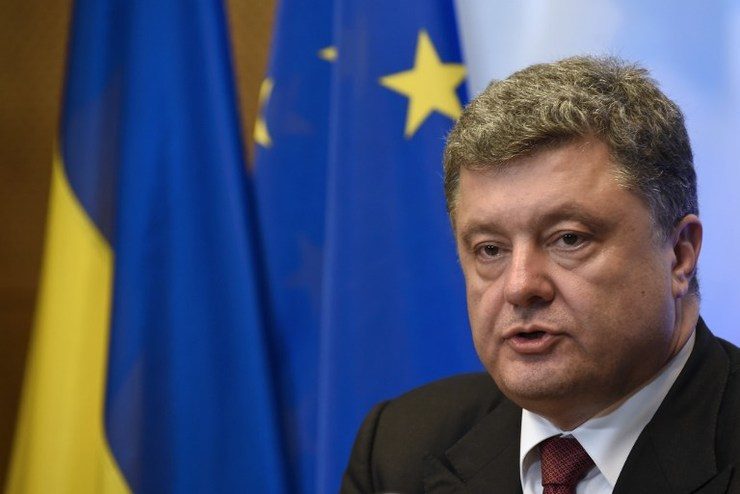SUMMARY
This is AI generated summarization, which may have errors. For context, always refer to the full article.

KIEV, Ukraine/TALINN, Estonia (UPDATED) – Beleaguered Ukrainian President Petro Poroshenko announced Wednesday, September 3, that he and Russia’s Vladimir Putin had agreed a surprise truce in Ukraine’s four-month war with pro-Moscow rebels.
But the Kremlin immediately denied any formal agreement and stressed that Russia played no role in the conflict despite Western claims that it has orchestrated the insurgency tearing apart the ex-Soviet state.
Kiev’s announcement raised hopes of an end to fighting that has killed at least 2,600 people and driven relations between Russia and the West to their lowest ebb since the Cold War.
Poroshenko’s office said the deal with Putin was reached in a telephone conversation.
They struck “an agreement for a permanent ceasefire in Donbass (eastern Ukraine),” a brief statement said. “An understanding was reached concerning steps that will help to establish peace.”
But doubts quickly followed the announcement, which came in advance of a NATO summit on Thursday, September 4, at which the Western military bloc is expected to approve a new rapid reaction force for defending eastern Europe.
The Kremlin denies giving more than moral support to the insurgents in eastern Ukraine and said there was no official truce agreement.
“Putin and Poroshenko really did discuss steps that would lead to a ceasefire between rebels and Ukrainian troops,” Kremlin spokesman Dmitry Peskov told the RIA Novosti state news agency .
“But in principle Russia cannot agree on a ceasefire as it is not a participant in the conflict.”
US President Barack Obama – on a highly symbolic visit to former Soviet republic and new NATO member Estonia – said it was “too early too early to tell what this ceasefire means.”
“There is an opportunity here. Let’s see if there is a follow up,” Obama said.
The Ukrainian presidency itself partly backtracked by amending its initial statement to remove the word “permanent.” But it left the rest of the ceasefire announcement intact and did not comment on reasons for the change.
Neither was it clear if rebel commanders who have been routing Ukraine’s army in recent fighting were ready to comply.
Unbending NATO support
Obama used his Estonia visit to announce the deployment of extra US air force units to defend the tiny Baltic state’s border with Russia.
“Estonia will never stand alone,” he said.
This comes in addition to a decision expected at the 28-nation NATO summit in Wales on creating a 4,000-strong force that could be deployed within two days to meet any Russian military movements in eastern Europe.
NATO’s tough talk is being matched by Russia’s announcement on Tuesday, September 2, that it would review its military strategy to consider the Western alliance a “threat.”
But NATO leaders have few options in helping Ukraine – a nation of 45 million struggling to leave the Russian orbit and join both the European Union and eventually the US-led military alliance.
Direct military intervention has been ruled out and economic sanctions imposed on Russia have yet to show any sign of changing the Kremlin’s hawkish ways.
NATO has published satellite images purporting to show more than 1,000 Russian troops and heavy weaponry moving into Ukraine’s east.
There are accusations that the Kremlin’s ultimate aim is to use the separatists to carve out a land corridor linking Russia to Crimea – a strategic Black Sea peninsula that Moscow-backed troops seized in March.
But Russia says it only backs the insurgents’ political drive for some form of independence from the pro-Western leaders who rose to power in Kiev after the February ouster of a Moscow-backed administration.
Putin is now seeking “statehood” for the heavily Russified eastern districts of Lugansk and Donetsk. Poroshenko has so far insisted that he can crush the rebellion and reunify his fragmented country.
But his negotiating position with both Russia and the insurgents had weakened dramatically in recent days by events on the ground.
Government forces have in some cases simply abandoned their equipment as they cede swaths of territory that they had initially won back from the militants.
A senior diplomatic source in Kiev told Agence France-Presse that Poroshenko had “red lines that could not be breached – Ukraine’s unity and integration with Europe.”
But “everything else is open to negotiation,” the Ukrainian official said. – Rappler.com
Add a comment
How does this make you feel?
There are no comments yet. Add your comment to start the conversation.